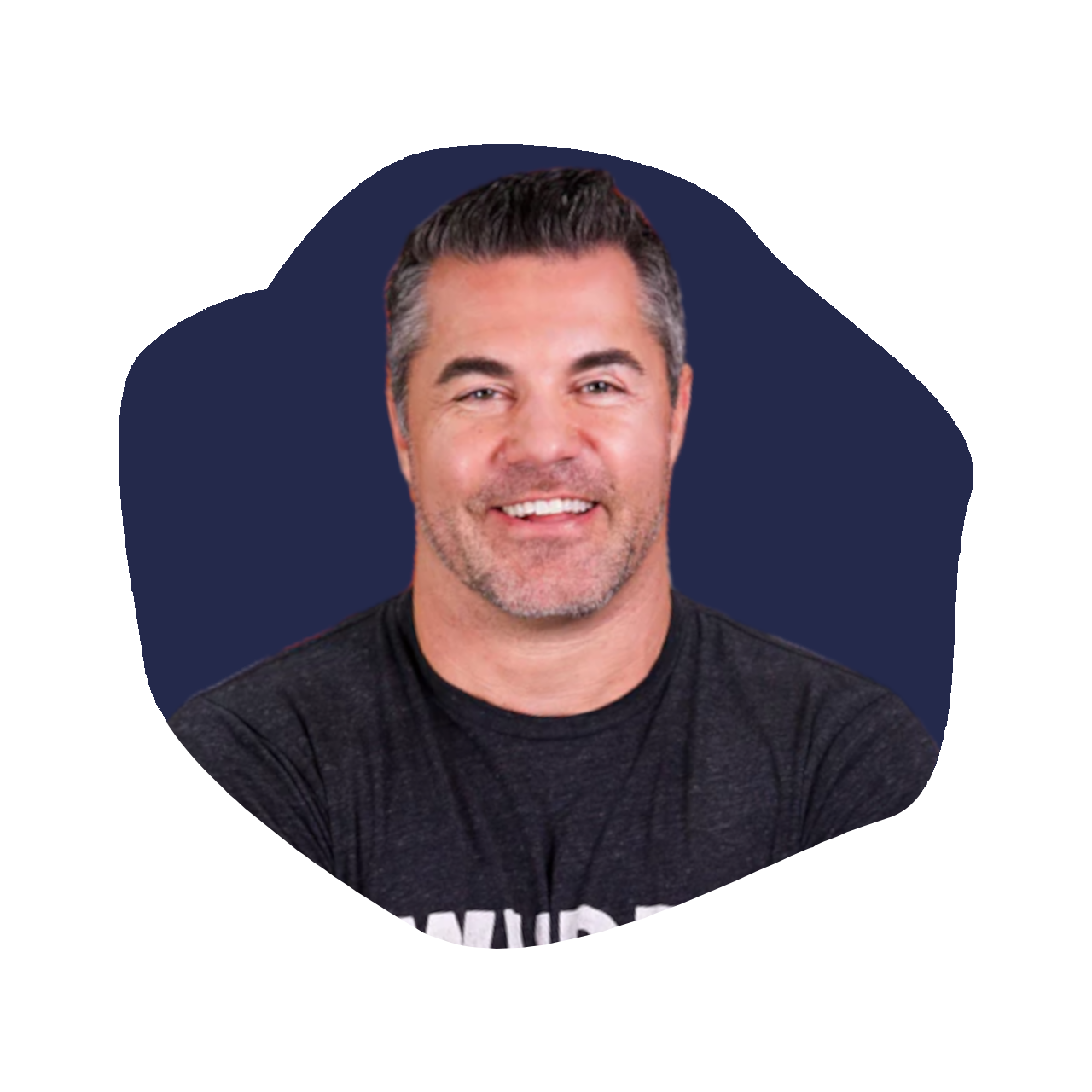Mori Taheripour: Author of Bring Yourself
Episode 484

In this episode, Mori Taheripour discusses her book Bring Yourself and the practical approach it takes to negotiations. She highlights the challenges and socialization around negotiations and emphasizes the importance of emotional intelligence in negotiation with tips for using it effectively. She also explores different types of negotiators and how to navigate negotiations with them. The conversation concludes with a focus on knowing one's self-worth and setting boundaries in negotiations. On this episode of #TheKaraGoldinShow.
Resources from
this episode:
Enjoying this episode of #TheKaraGoldinShow? Let Kara know by clicking on the links below and sending her a quick shout-out on social!
Follow Kara on LinkedIn – Instagram – X – Facebook – TikTok – YouTube – Threads
Have a question for Kara about one of our episodes? Reach out to Kara directly at [email protected]
To learn more about Mori Taheripour and Bring Yourself:
https://www.instagram.com/mtaheripour/
https://www.linkedin.com/in/moritaheripour
https://www.twitter.com/MoriTaheripour
https://www.moritaheripour.com/
Transcript
Kara Goldin 0:00
I am unwilling to give up that I will start over from scratch as many times as it takes to get where I want to be I want to be, you just want to make sure you will get knocked down. But just make sure you don’t get knocked down knocked out. So your only choice should be go focus on what you can control control control. Hi, everyone and welcome to the Kara Goldin show. Join me each week for inspiring conversations with some of the world’s greatest leaders. We’ll talk with founders, entrepreneurs, CEOs, and really some of the most interesting people of our time. Can’t wait to get started. Let’s go. Let’s go. Hi, everyone, it’s Kara Goldin from the Kara Goldin show. And I’m so thrilled to have my next guest here, we have Mori Taheripour, who was the author of an incredible book that you need to get your hands on called Bring yourself and if you have not heard about this book, I hope that you will reach out and wherever your favorite places to buy books and get a copy of it. But it is a book that is about something that even if you’re not in business, need to understand how to negotiate. So that could be figuring out how to negotiate with your children, figuring out how to negotiate with your plumber, I don’t know anything that you need to do. I kept thinking as I was going through her book, that negotiation really is not just for business, although definitely Mori is teaching at one of the top schools in the country at Wharton, where she focuses on the human side of negotiating her method isn’t prescriptive, she helps people get out of their heads and let go of self judgment and get comfortable with stillness. She also coaches people to lead conversations with an open mind and figure out what feels right for them, which I love. Negotiation is not a one way street. And I can’t wait to dig into this more with her. Like I said, her book is absolutely awesome. called Bring yourself and definitely excited to have more here today. So thanks for coming on Mori.
Mori Taheripour 2:14
I’m so excited. That was like the best intro ever. I think like the perfect book today, I feel like I need to just press you know, replay every time I speak somewhere because I was like you captured it ever so perfectly. Oh, I
Kara Goldin 2:31
love it. Well, you are so inspiring. And this book, as we were just talking about it actually came out a couple of years ago, the same year that my book came out. And, and definitely I was watching sort of the other books that were out at the same time. And yours definitely was one of them. So I think it’s it’s such a great, great book. And I’m excited, like I said to have you here on the show. So as I mentioned in the intro, you wrote this book, kind of based on a lot of what you’re teaching and your theories on negotiation. Over the years, you’ve had a top class, you are a nine time Teacher of the Year at Wharton. I mean, amazing, amazing. Congratulations. But
Mori Taheripour 3:24
as of recently, so 11. Okay,
Kara Goldin 3:27
so who here I’ll say you are a 11th time Teacher of the Year at Wharton, which is amazing. So can you give us a brief overview of the book? Like how would you describe it to somebody when maybe you’re introducing yourself as as an author? And they say, Well, what did you write a book on?
Mori Taheripour 3:46
So yeah, I think the first thing I do is I tell them it’s not a textbook, because the minute you talk about sort of a negotiations book or business book, people think it’s going to be very, like he said, very prescriptive, very formulaic. You know all about tactics, just reading like a, like a textbook. And so I immediately tell them, it’s about negotiations, but it’s really about my life. And sort of my experiences and the experiences with people that I’ve worked with from entrepreneurs to athletes, my Wharton students. And I thought the story of negotiations and the message I want wanted to deliver was best told that way through the eyes of experience. And it’s very practical skills. So it wouldn’t make sense. If I just said, you know, here’s the strategy, I really wanted to give it through the lens of people who had successes had challenges, how they got around those challenges, and really about sort of some of the myths that I think hold people back around negotiation. So I would I would really describe it as a book that you can always sort of grab off the shelf. That gives you really practical advice around negotiations, but really also talks about the mindset of a negotiator. Successful negotiator. really delves into things like knowing yourself more and being your best advocate and doing so sort of unabashedly and, and courageously and really speak knowing that speaking up for yourself, first and foremost is your is your duty, and not something that makes you greedy or not something that you should be judged by or even you judging yourself. But it’s really something that every great negotiator does, which is take care of themselves. First, in order for us to take care of others, so a little mythbusting, a little bit of a autobiography, and hopefully something that would be helpful to a lot of people.
Kara Goldin 5:33
Why are negotiations so difficult for people?
Mori Taheripour 5:40
I think part of it is socialization. And this could be cross culture, it could be cross gender. You know, especially if we talk about women, a lot of times, you know, we’re not brought up to be somebody that speaks up for ourselves, right, it’s sort of like, be careful how much you ask for, there’s a judgment that’s associated with it. And I think that’s also true in different cultures as well. So part of our socialization, I think, leads to the difficulty that we have, or the anxiety we have around negotiations. The other part of it is, you know, part of that socialization is what we see in the movies, or what we see on TV, we typically see somebody who’s either a man, or has male sort of qualities and characteristics, and personality traits. So there are charging there contentious or sort of in your face. And a lot of people don’t really associate with them themselves with some with somebody like that, right? So many, many people I work with, say, I always felt like I couldn’t be a great negotiator because and then fill in the blanks. I’m not contentious. I don’t like conflict. I like being collaborative. I like problem solving. And really, all those things actually make for a great negotiator. I just think that we’ve been sent so many messages that make people sort of put themselves on the sideline, and think that they can’t find success. And it’s, it’s couldn’t be further from the truth. And I’m not saying that there’s not room for somebody who’s aggressive, or they can’t be successful. There’s many who are. But there’s so many other personalities that lead to or even sort of approaches to negotiations that lead to success. And I think I think we’re just we don’t see enough models of people who are more sort of diplomatic or collaborative or look at negotiations as win win. Right. So I think, I think a lot of that has led to people thinking, I’m not very good at doing this.
Kara Goldin 7:39
Yeah, I think you nailed it to about the conflict. And it’s just going to be a lot easier just to walk away for so many people. But when they actually think about what they really want, and sort of living with those kinds of decisions not to actually negotiate it’s tears people apart, right, that they should have done more to stick up for themselves or or negotiate. So why is it so important to understand what type of negotiator you’re dealing with?
Mori Taheripour 8:09
Because I think that people don’t spend the time to be honest with you. They do a lot of preparation ahead of time, but most of what they think about is, is this, is this person, what are they looking for? Right? What are they going to be asking for? What’s their outcome that they want out of this negotiation, and those things are important. But the time spent actually thinking about the human side of negotiations, is not something that we focus on. And I really actually don’t think we focus on it in this society in the US. We’re very efficient, we just want things done quickly, right? The deal, basically, the conversation to be done quickly, there’s not time to sort of look at the relationship side of this. And, and so I think that, first of all, if you don’t spend the time, and you just jump into the deal itself, without having that time to build bridges, and to build rapport and to focus on the other person, not just what they want, but who they are to really see somebody, then I think that it leaves sort of it makes everything very black and white, it sort of takes away the shades of grey that I think are so beautiful and actually getting to know somebody. And so when we just jump to what is this person going to want. First of all, it’s filled with assumptions. It’s built with biases, it’s built with stereotype types. And so we’re not getting it sort of this whole notion of slowing down, to do better slowing down to make better decisions, slowing down to build rapport slowing down to make thoughtful decisions that are not based on assumptions alone. And I think that that’s that’s what makes it difficult for people because they think they have to hurry up and get this over with especially if they have anxiety to begin with. Right? They feel like it’s so painful. Let me just hurry up and be done with it. Whereas that’s actually really the worst thing you into because there are so many nuances to people that if you understand them, they can actually make for a better deal making.
Kara Goldin 10:09
What’s the most difficult type of negotiator?
Mori Taheripour 10:13
Well, probably, like I just said, I’m somebody that is rushed, that they don’t feel like they have time for the people side, right? And a lot of times those people think that the person sitting across from them if they are asking about them, it’s because they’re doing it to be not doing it from good intentions, but really doing it to be deceiving. And how can I get over on you and sort of like the used car salesman approach, right? So if you’re trying to have small talk, it must mean that you want something that is not, you know, honest, or you’re trying to take advantage of me. So if you come in really doubting the other person’s intentions, then, you know, to convince that person that no, this is really what I want, first and foremost, is to get to know you. It’s not about the transaction. It’s not about what I can get from you. But to make a better deal here. I think it’s important for us to have some of this conversation and lay the groundwork, I find those people who are really sort of whether it’s because they’ve been scarred or they have these false notions of what negotiations is they have trust issues. I think those people are probably the hardest. Some people say it’s people who lie or deceiving. But I almost think that, first of all, that’s hard to control anyway, for but I think the people that look at negotiations as a mere transaction, and you have to sort of really work to make them to make have them think differently about it, or are probably most difficult.
Kara Goldin 11:45
Definitely. So do men and women negotiate differently? You talked a little bit about the, you know, I would say, many women avoid conflict. But I actually think there’s a lot of men that want to avoid conflict, too. And but I’m so curious if there’s, if you tend to see that there’s a big difference in how people negotiate.
Mori Taheripour 12:09
I don’t know if it’s a big difference. So much as it is we communicate differently, right men and women communicate. And so I think it kind of boils down to that. And so of course, there’s a difference, but I think that it’s not as simple as gender, like to your point, not all women negotiate one way not all men negotiate one way, right, there’s, and I hate to put people in those categories. But there’s a lot of research, there’s a lot of trends. And I think that if I was to say the sort of the main difference between men and women is sort of the way we walk through our lives as well, is competence. And men tend to have a lot more competence. And again, I think it starts from a very young age, and they’re socialized for those things. And women, we doubt ourselves a lot, we don’t have the same level of confidence. There’s this sort of, we’re like paralyzed by perfection, right? So we want to show up perfectly. And we want to have every bit of experience per job that we qualification that we want to apply to a job that we want to apply for. We doubt ourselves, right? And so the second guessing, I think, has a lot to do with the outcomes of negotiations, because in that second guessing comes, is that room for me at this table? What will they think of me if I asked for this much? You know, am I even supposed to ask for a raise? Right now there’s a pandemic, you know, all of that sort of self doubt, I think creeps in much more with women than men. I certainly don’t think it’s because we’re not qualified enough to do it. I certainly don’t think that our approach to negotiations is any less favorable. In fact, I would say we’re in a lot of ways if you boil it down to just skills and and the way we sort of approach people, we’re far more qualified in some ways, because we do value relationships, we do value problem solving, we do value ethics. And so again, big big generalizations, but that’s just sort of, I think, a lot of what research shows us but it’s not that we’re not, we’re not competent enough. It’s that I don’t think we realize how competent we really are.
Kara Goldin 14:20
So one of the key themes for negotiation in your book is to get out of your head and connect with your emotions, how can individuals or organizations navigate this?
Mori Taheripour 14:33
I think the things like both on organizational perspective, I think the culture that you install on the organization, right, having sort of this true sort of inclusive culture where where people are valued for who they are, but now not who they’re supposed to be. And so if you really sort of address people in that way, and and try to sort of have them I hate to say this, but bring bring themselves right, which is the title of the book, but bring themselves to work, bring themselves to the office bring themselves to the project in a way that’s authentic to them, then I think those are the sort the strongest ones that most successful cultures write in a business, be it a small company, be it the way a founder manages their their startup, be it a fortune 100 company. I think as far as those with the individual approaches, negotiations, and why I say it’s so important to get out of your own way, is that nobody can tell you how much you’re worth. And make you believe it unless you believe that first yourself. And so to give yourself permission to you know, this sense of deserve bidness, right, to believe that you deserve more to believe that you have worked your butt off for this promotion, and that You certainly deserve it, not just walking and saying I deserve more, but saying, look at all the things that I’ve accomplished, and how that makes me deserving of this promotion, how that makes me diverse, deserving of this salary increase? I think we have a really hard time doing that. And certainly almost impossible, if you don’t have self confidence. And those are the things that if you don’t learn to better address, particularly for people who have had challenges in our life, who have impostor syndrome, who had had traumatic experiences in their life, who have had bad breakups, whatever it is, that leads to sort of that, that mindset of being less than, then I think that if we don’t address those things first, then it’s really hard to be an excellent negotiator. And it’s sort of strange for people when they come into my class, because so much of my work is around that. First, I don’t think any strategy will make you successful, if you don’t think that you deserve something in the first place, or that you are not worthy of. So a lot of that sort of emotional hygiene, a lot of that sort of work that is so personal and looking inward is so important. And I just feel like, if you don’t make that a priority, it makes everything else quite impossible when it comes to negotiating for yourself.
Kara Goldin 17:21
Can you talk about the different types of negotiators? There’s all kinds, right?
Mori Taheripour 17:27
Yeah, there’s so many kinds of the sort of the, the general kind of categories of negotiators. So there’s, there are people who are really competitive, obviously, we just talked about that was sort of seeing negotiations as more of a game, that kind of anything goes right. And they get very excited about the notion negotiations, because to them, that’s the way that they’re gonna get what they want. There’s really sort of four fearlessness around it. There’s the accommodating negotiators, right, the the people pleasers, if you will, the other side of it. So their goal is I want to make the other person sitting across from me, as happy with us, as I am, if not more so. And they tend to be far more emotionally intelligent, they tend to spend a great deal of time trying to figure out what the other person wants. They’re very good actually, in that way. So they really want to get into the other person’s head. They’re quite empathetic. And so that’s where they put their energy. Right? So kind of the opposite of the competitive negotiator. Then there’s the person who wants to just avoid negotiations altogether, right there. They don’t like it. They don’t want to do it in their heads, they have sort of this, this fear of negotiations, usually driven by the fact that they don’t want conflict. And that’s how they see negotiations. And studies shows actually, that this is the predominant personality type and negotiations, actually, more people around the world are in that sort of avoidance category than any other category, which, again, leads to why there’s so much so many myths around negotiations and why people don’t feel comfortable with it. Then sort of in between all that are sort of the collaborative people who are more problem solving. And they tend to take things really slowly. They want to get as much information as possible before they make decisions or before they even go into the negotiations. And and so more consensus building. And I think last one is the person who I call this but the difference folks who don’t mind negotiating, they don’t love it. So the minute they can say, Okay, you want as pretend I asked for 20 Let’s say 15. Let’s go out for drinks. It’s because and by the way, it’s like 15 minutes into this discussion. They just don’t want to be in it so that the quicker they can do it, the better it is. But again, it’s not that they have fear about going into it, they just have sort of difficulty staying in that conversation.
Kara Goldin 20:08
So what if you’re dealing with a negotiation that the person acts like they’re the decision maker, but they’re not. And you’ve got somebody, you know, you’re sure that or maybe they are the decision maker, but they’re blaming, you know, there’s, there’s scales for different salary ranges, and you know, can’t do it or whatever. How do you deal with somebody like that, who you’re quite sure, based on your own knowledge, or just by talking to them that they’re not actually the decision maker? How do you negotiate that?
Mori Taheripour 20:44
I think that you still have to treat them almost like they are the decision maker, because people are people, right, and nobody wants to feel dismissed. Nobody wants to feel like they’re not important enough. And if it’s, indeed, they are not the ultimate decision maker, they are going to be your advocate or not, right. So you want to talk to them in a way that they’re delivering the message that you want to be delivered. And that is also inclusive of how they treat how you treat them, right. So it’s not just the great deal that you’re offering, it’s that by the way, this person was very respectful. They’re very prepared, but not conceited. They were really sort of empathetic, they spent a lot of time they weren’t rushing us, they were sort of really kind of a joy to to speak to, right, a very enjoyable conversation, a really positive experience. And you’re sort of stamping that, right? Like, the way you treat people I think is so important. And I hate that sometimes people, it’s the way people are with assistance, right? They’re not the boss. So you know, whatever, I’m not gonna, I’m not gonna really treat them fortunately. And I just need them to connect me with the person who’s really important. Well, what people don’t realize is that that person, if they don’t like you, you’re probably never gonna see their boss anyway, right? They’re never gonna find face cream on that person’s calendar. And somehow their boss was always busy. It’s because everybody wants to feel seen, and everybody wants to feel respected. So I think my biggest word of advice is, treat everybody the same. And that is with respect. And with empathy, and with a sense of, you know, nobody is more important than you in this conversation. Nobody’s competing for my attention. This is it. And I think when you do that, it’s far more likely that your message, the opportunity will be delivered in a way that’s really positive, and they’ll advocate for you.
Kara Goldin 22:45
So you talk about emotional intelligence. And I guess, to some extent, that also speaks to that. But what are some tips for using emotional intelligence to negotiate effectively?
Mori Taheripour 22:56
First tip is put every device that you have a way that could be, you know, sort of robbing you of your attention, right? Very hard to be emotionally intelligent, if you’re not present. Really hard to be emotionally intelligent, if you’re not mindful. Distraction is not your friend, when it comes to emotional intelligence. So we’re naturally distracted anyway. But I think that emotional intelligence is so important, because it gives you information, way beyond just sort of the, I don’t know, deal points or so data, right? Emotional Intelligence gives you an opportunity to, to understand how somebody’s reacting to you. Emotional Intelligence, allows you to get information from someone in a way that they don’t even know they’re delivering, right, the smile, the glance, the the look of, you know, being puzzled, or not really understanding what you’re saying, you’re not just continuing to talk and get the same pitch over and over again, without even looking at somebody and say, I don’t think they really understood what I just said, right? They look, a little puzzle, they look a little confused. Let me repeat that. Or let me say it in a different way. You slow down, you change the way you change the way you frame, what you just said, because you were seeing that that person is not really either comfortable or understanding what you just present it hard to do that if again, you’re distracted. So I think the first tip is don’t be distracted. And to sort of further that is pay attention to everything. There. There’s a lot of information to get from people, and they don’t even open their mouth, right from the glance again, the body language. But if you’re distracted, it’s really, really hard to do that. And one last thing is if you’re not emotionally intelligent, and this notion of you know, emotions getting in the way of negotiations or sort of tempers rising and the heat sort of going up in the conversation. It We are sort of headed in the direction of conflict, it’s hard for us to have that sense board sometimes because we’re just reacting to it physically. And if you are not present and you don’t understand what you’re saying maybe or how you’re setting up all of a sudden, or, or the way you’re approaching this person with the language that you’re using, if, if you’re not really present, that actually can really sort of dictate how quickly you get into that place of conflict or, you know, tempers flaring, you don’t even know what’s happening. And then all of a sudden, you’re like, why are we yelling at each other? Right? You weren’t even present enough to know that that train was coming?
Kara Goldin 25:38
Yeah, really, really excellent point. So bring yourself is such a great book, everybody needs to grab a copy of it. There’s so many great pieces in here that you can I mean, it’s a reference guide. So I’m not going to give up my book, because I’m definitely different types of negotiations, you have to go back and really look at it for a resourcing on how to deal with different situations. You talk about frameworks in there as well, you just touched on that a few minutes ago. But what would you say? What’s your best advice for people, you’ve given lots of pieces of advice, to date, but someone entering into an negotiation, one of the most important things for them to remember,
Mori Taheripour 26:25
one, I would say that it actually is knowing your self worth. And doing so without fear judgment, without this notion of guilt. Because, again, it’s your responsibility to take care of yourself. And there should be no shame or guilt associated with that. And I think that, that’s sort of the basis of it, right? And it’s sort of step one, if you can’t do that, then it’s very hard to get what you want. It’s very hard to not settle, right. And you’ll always feel the sense of being defeated, you’ll always have this sense of I gave away too much, or nobody takes anything from you that you’re not willing to give. And so that helps you draw better boundaries, that helps you better treat people or treat them the way you want to treat them because you have a really good understanding of who you are, and what’s important to you of your values. So I think that helped work that sort of understanding yourself better, and giving yourself time for reflection that’s not focused on anything else, but yourself, first and foremost. So I would say, at any given day, you asked me that question, I’ll probably say something different that I think that in the world that we’re living in today, that’s not so kind, that, you know, a lot of us feel, you know, really sort of beat down with the way either were treated or we see other people being treated, I think, to spend a little bit of that time giving yourself empathy, and self care and self love is so important, and really is the first step. So I would say that, that’s probably the first place I would lean today.
Kara Goldin 28:13
Great advice. So Mori, thank you so much. The book again is called Bring yourself and definitely pick up a copy of it or audible as well. And, and definitely Moria really appreciate you coming on and explaining a little bit more. Everybody’s in negotiations every single day. Some are more critical than others, but I really loved your book and everything about it and meeting you too. So thanks again. Thanks, everyone, for listening.
Mori Taheripour 28:44
Thank you, Kara.
Kara Goldin 28:45
Thanks again for listening to the Kara Goldin show. If you would, please give us a review. And feel free to share this podcast with others who would benefit and of course, feel free to subscribe so you don’t miss a single episode of our podcast. Just a reminder that I can be found on all platforms at Kara Goldin. I would love to hear from you too, so feel free to DM me. And if you want to hear more about my journey, I hope you will have a listen or pick up a copy of my Wall Street Journal, best selling book undaunted, where I share more about my journey including founding and building hint. We are here every Monday, Wednesday and Friday. Thanks for listening and good bye for now. Before we sign off, I want to talk to you about fear. People like to talk about fearless leaders. But achieving big goals isn’t about fearlessness. Successful leaders recognize their fears and decide to deal with them head on in order to move forward. This is where my new book undaunted comes in. This book is designed for anyone who wants to succeed in the face of fear overcome doubts and Live a Little undaunted. Order your copy today at undaunted the book.com and learn how to look your doubts and doubters in the eye and achieve your dreams. For a limited time, you’ll also receive a free case of hint water. Do you have a question for me or want to nominate an innovator to spotlight? Send me a tweet at Kara Goldin and let me know. And if you like what you heard, please leave me a review on Apple podcasts. You can also follow along with me on Facebook, Instagram, Twitter and LinkedIn at Kara Goldin. Thanks for listening









